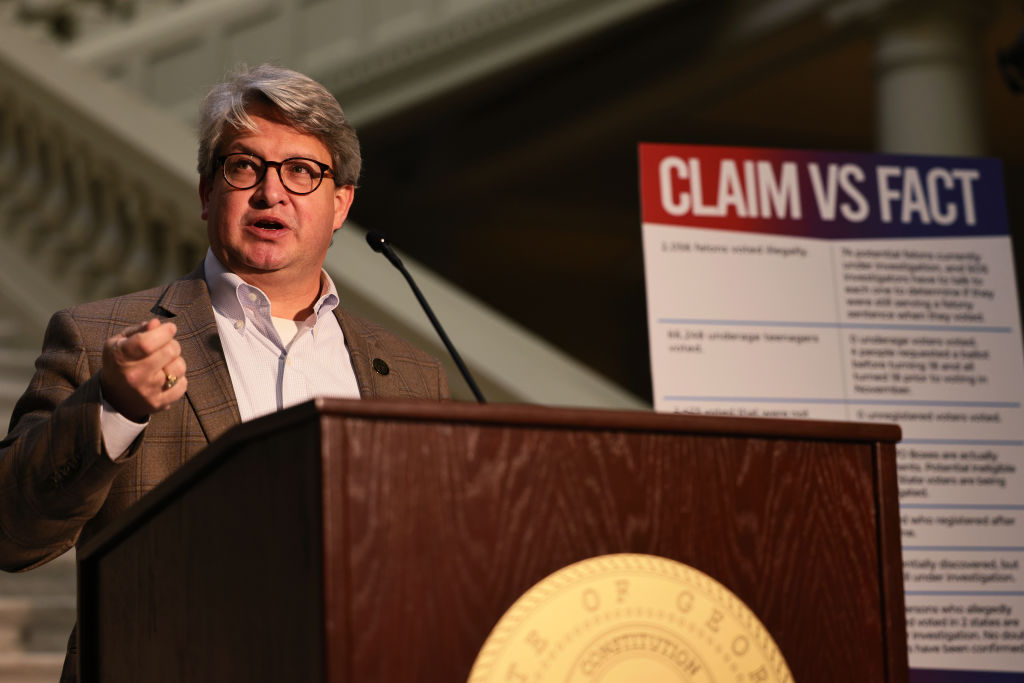Georgia GOP election official who debunked Trump's fraud claims defends state's new voting restrictions


A free daily email with the biggest news stories of the day – and the best features from TheWeek.com
You are now subscribed
Your newsletter sign-up was successful
Gabriel Sterling, a Republican election official in Georgia, made a name for himself late last year when he defended the integrity of his state's presidential vote and frequently debunked former President Donald Trump's claims of fraud. Now, though, he's defending a controversial new state voting law signed by Georgia Gov. Brian Kemp (R) last week that critics say will particularly affect voters of color.
In an interview with MSNBC's Joshua Johnson on Friday night, Sterling did not appear to agree with his fellow Georgia Republicans, including Kemp, who argued that reforms were necessary after the 2020 election, even though there's no evidence of widespread fraud despite multiple recounts and an audit of ballot signatures. "Politicians gonna politic," but that doesn't mean there aren't "good things" in the law, he said, praising the switch from signature verification to identification number verification, in particular.
"Nothing in this bill suppresses anyone's vote," Sterling wrote on Twitter later. "Those saying so are just stirring the pot and raising money. The claim of voter suppression has the same level of truth as the claims of voter fraud in the last election."
The Week
Escape your echo chamber. Get the facts behind the news, plus analysis from multiple perspectives.

Sign up for The Week's Free Newsletters
From our morning news briefing to a weekly Good News Newsletter, get the best of The Week delivered directly to your inbox.
From our morning news briefing to a weekly Good News Newsletter, get the best of The Week delivered directly to your inbox.
The Week's Bonnie Krisitian writes that there are indeed "some common sense reforms" in the bill, as Sterling argues, but other measures, like criminalizing both photographing your own ballot and giving people food and water while they wait in line to vote or reducing the number of absentee ballot boxes available and limiting the time someone can request an absentee ballot, are "blatantly restrictive." Read more at The Week.
A free daily email with the biggest news stories of the day – and the best features from TheWeek.com
Tim is a staff writer at The Week and has contributed to Bedford and Bowery and The New York Transatlantic. He is a graduate of Occidental College and NYU's journalism school. Tim enjoys writing about baseball, Europe, and extinct megafauna. He lives in New York City.
-
 Book reviews: ‘Bonfire of the Murdochs’ and ‘The Typewriter and the Guillotine’
Book reviews: ‘Bonfire of the Murdochs’ and ‘The Typewriter and the Guillotine’Feature New insights into the Murdoch family’s turmoil and a renowned journalist’s time in pre-World War II Paris
-
 Witkoff and Kushner tackle Ukraine, Iran in Geneva
Witkoff and Kushner tackle Ukraine, Iran in GenevaSpeed Read Steve Witkoff and Jared Kushner held negotiations aimed at securing a nuclear deal with Iran and an end to Russia’s war in Ukraine
-
 What to expect financially before getting a pet
What to expect financially before getting a petthe explainer Be responsible for both your furry friend and your wallet
-
 Rubio boosts Orbán ahead of Hungary election
Rubio boosts Orbán ahead of Hungary electionSpeed Read Far-right nationalist Prime Minister Viktor Orbán is facing a tough re-election fight after many years in power
-
 Key Bangladesh election returns old guard to power
Key Bangladesh election returns old guard to powerSpeed Read The Bangladesh Nationalist Party claimed a decisive victory
-
 Epstein files topple law CEO, roil UK government
Epstein files topple law CEO, roil UK governmentSpeed Read Peter Mandelson, Britain’s former ambassador to the US, is caught up in the scandal
-
 Iran and US prepare to meet after skirmishes
Iran and US prepare to meet after skirmishesSpeed Read The incident comes amid heightened tensions in the Middle East
-
 EU and India clinch trade pact amid US tariff war
EU and India clinch trade pact amid US tariff warSpeed Read The agreement will slash tariffs on most goods over the next decade
-
 Israel retrieves final hostage’s body from Gaza
Israel retrieves final hostage’s body from GazaSpeed Read The 24-year-old police officer was killed during the initial Hamas attack
-
 China’s Xi targets top general in growing purge
China’s Xi targets top general in growing purgeSpeed Read Zhang Youxia is being investigated over ‘grave violations’ of the law
-
 Panama and Canada are negotiating over a crucial copper mine
Panama and Canada are negotiating over a crucial copper mineIn the Spotlight Panama is set to make a final decision on the mine this summer
